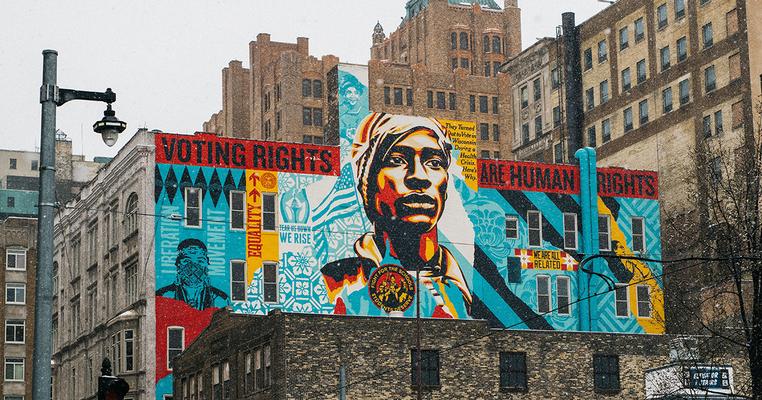
Why the Fight for Voting Rights Is a Fight for the Planet
What may be the most consequential bill for the climate in US history doesn’t actually mention climate or global warming or any related terms. Not even once.
But whether the Freedom to Vote: John R. Lewis Act now in Congress passes or fails could ultimately have infinitely greater ramifications for the planet than any bill currently proposed. Greater, even than the historic Build Back Better Act that explicitly aims to slash emissions and accelerate clean energy transition nationwide.
Take Action: Tell Your Senators – Protect our Freedom to Vote
In case you missed it, since the 2020 election, state legislators around the country have proposed hundreds of new bills designed to make it harder for Americans to exercise their freedom to vote. Nineteen states have already passed 34 of them, with over 100 more now under consideration.
And in a trend that should have all the alarm bells ringing for anyone even remotely concerned about democracy, a growing number would give partisan legislators the power to control who counts votes and whose vote counts – or just plain toss out results they don’t like.
The goal is no secret. After all, even recent history shows that in both subtle and overt ways, voter suppression bills overwhelmingly target and silence voters of color. Witness, for example, how just last year, a North Carolina judge permanently struck down a law designed to make it harder for Black voters to vote. (A previous version was struck down after the judge noted that the provisions deliberately "target African-Americans with almost surgical precision.") The list goes on and on and on.
The result is that after decades of progress toward the truly inclusive democracy we aspire to be, we now face the real possibility of effectively a two-track system for voting. One where some voters have the freedom to vote and know their votes will count while others (largely people of color and poor families) do not.
That’s not the country we want.
The Climate Connection
The threat of these voter suppression and election sabotage bills extends beyond the existential threat to our freedoms.
The bottom line is that without free and fair elections, we lose our voice both in our leaders and in the future of our planet.
When you get down to the nuts and bolts of it, what drives the climate movement is the simple belief that everyone who spends a minute or two on this Earth should have a say in its future. Whatever you look like. Wherever you come from. That you shouldn’t have to be a billionaire or energy executive to have a voice in what happens to this planet we all share.
Most of us don’t have the $84 million the fossil fuel industry spent in the 2018 election cycle to reward legislators for blocking climate and environmental progress. What we do have is our vote.
That vote becomes all the more critical when you consider recent analysis showing that if the US is to have any shot at halving emissions by 2030 and doing its part to holding warming to 1.5 degrees, we need the incredible power of the federal government and big, smart bills like the Build Back Better Act.
Take our freedom to vote away and that 2030 goal basically goes away.
It’s not just a question of if the government gets serious about climate action. It’s also how.
The global transition to clean energy – with the right government support – has the potential to be, in the words of one Department of Energy official, “the largest wealth creation opportunity of our lifetime.”
Who this opportunity and wealth goes to is still an open question. To put it plainly, energy transition can just reinforce the old inequities of the fossil fuel economy that got us here and widen the devastating racial wealth and health gaps in this country. Or it can be perhaps the greatest force for equity the country has ever seen, giving businesses and workers of color real opportunities and the chance to build generational wealth.
We’re voting for the second. But to get there, we need to be able vote in free and fair elections.
Time to Speak Up
The Freedom to Vote: John R. Lewis Act would go a long, long way in creating commonsense national standards and protecting the freedom of all Americans to vote and know their votes will count.
It’s bill we’ve been waiting for – and it’s already passed the House of Representatives. Now the Senate faces a historic choice that will shape the course of our democracy and our chance for aggressive climate action for decades.
This is our break-glass moment. Take action today.

